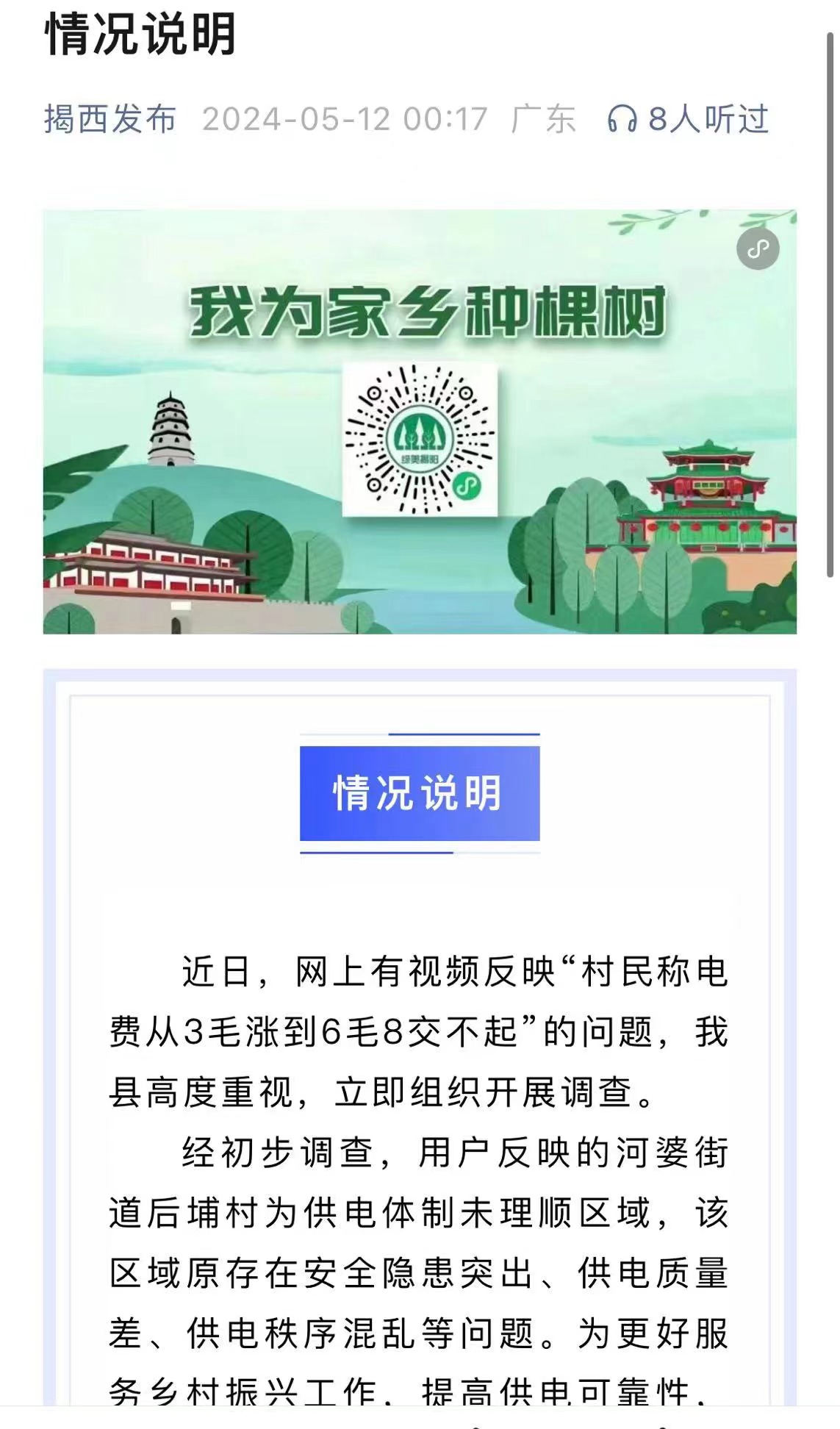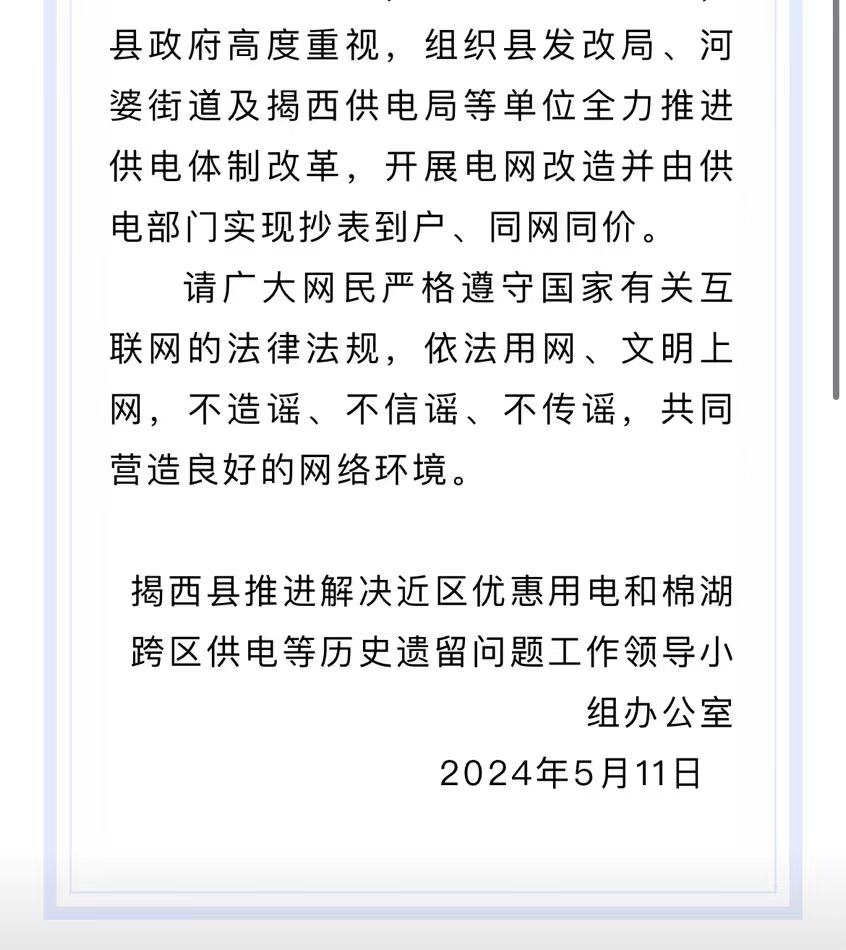Expert analysis suggests that the electricity price issue in a few villages such as Houpu Village is a historical legacy issue.
Some villagers in Houpu Village, Jiexi County, Jieyang City, Guangdong Province reported the problem of doubling the electricity price. On the 12th, “Jiexi Release” WeChat official account gave a public response, saying that “Houpu Village, Hepo Street, as reported by users, is an area where the power supply system has not been straightened out”. The reason for this is that “all efforts have been made to promote the reform of the power supply system”, “power grid transformation has been carried out and the power supply department has achieved meter reading to households and the same price for the same network”.
Recently, a villager from Houpu Village reported online that the electricity price for residents in the village has increased from 0.3 yuan/kWh to 0.68 yuan/kWh, and the electricity price increases with the increase of electricity consumption.
In response to this matter, the “Jiexi Release” WeChat official account released a fact sheet on May 12, saying that it attached great importance to the problem reflected on the Internet that “villagers said they could not afford to pay the electricity bill from 30 cents to 68 cents”, and had carried out an immediate investigation.
The situation indicates that after preliminary investigation, the user reported that Houpu Village in Hepo Street is an area where the power supply system is not properly organized. This area originally had prominent safety hazards, poor power supply quality, and chaotic power supply order. In order to better serve the rural revitalization work and improve the reliability of power supply, the county government attaches great importance to it. It organizes the county development and reform bureau, Hepo Street, and Jiexi Power Supply Bureau to fully promote the reform of the power supply system, carry out power grid transformation, and have the power supply department achieve meter reading to households and same grid and price.


According to villagers, the previous electricity price was 0.3 yuan/kWh because the elderly in the village had contributed to the construction of a reservoir for the local government and signed a contract with the local government to enjoy preferential electricity prices. But after the power supply department takes over the local power grid and other power assets, the corresponding electricity price adopts the same grid and price for residents to pay electricity, with a price of 0.68 yuan/kWh, which makes it difficult for villagers to accept.
At present, the electricity consumption of residents nationwide follows a tiered pricing system, which is mainly divided into three levels. Among them, the price standard for residential electricity in Jieyang, Guangdong is: the first price is 0.678 yuan/kWh; The second price is 0.728 yuan/kWh; The price for the third tier is 0.978 yuan/kWh.
Public information shows that Houpu Village is located in the central western part of Hepo Street, Jiexi County, 2 kilometers away from the county seat. The villagers mainly engage in agriculture, with some engaged in industry and commerce. The above-mentioned villagers stated that the average local salary is 2000 yuan, and after the increase in electricity prices, households have higher electricity bills in the summer, which has brought considerable pressure to their lives.
Lin Boqiang, Dean of the Energy Policy Research Institute of Xiamen University, analyzed in an interview with First Financial News that the electricity price issue in a few villages such as Houpu Village is a historical legacy.
These historical legacy issues include the issue of user electricity assets. In the past, electricity assets in some places belonged to users themselves. According to relevant policy documents, user power assets refer to dedicated network structures and their ancillary equipment, facilities, and other power supply supporting facilities built with user investment specifically for power access services. These power facilities often have safety hazards, poor power supply quality, and chaotic power supply order due to various reasons.
A power source told reporters that in many remote rural areas, due to outdated and outdated power grid facilities, the quality of power supply is relatively poor, and there are even safety hazards such as fires.
To address these issues, it has become a common practice for users to transfer their electricity assets without compensation. Free transfer mainly includes two situations: policy based overall transfer and users transferring their own property rights of power facilities as a whole or in part for free. The main implementing entities are local governments and their subordinate platform enterprises, residential community property or owner committees, real estate developers, etc. The assets transferred for free include transmission and distribution lines, measurement assets such as meters, substations, switching stations, box type transformers, ring network units, and power channels (corridors).
An insider from Southern Power Grid told First Financial reporters that historical legacy issues have allowed Houpu Village to enjoy relatively favorable electricity prices for many years. He stated that the electricity price adjustment is not related to the power grid enterprises, but is carried out according to the requirements of local governments.
According to its introduction, according to relevant requirements and arrangements, Southern Power Grid will take over the power grid in this area, carry out renovation and upgrading, carry out power grid construction and operation and maintenance services in accordance with the current national power industry design standards, and improve power supply reliability and service quality. At the same time, according to the principle of same network and same price, the electricity prices for residents in the takeover area will be executed according to relevant regulations.
